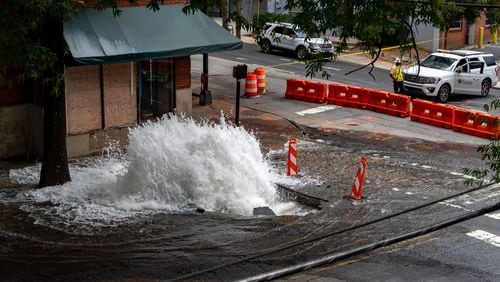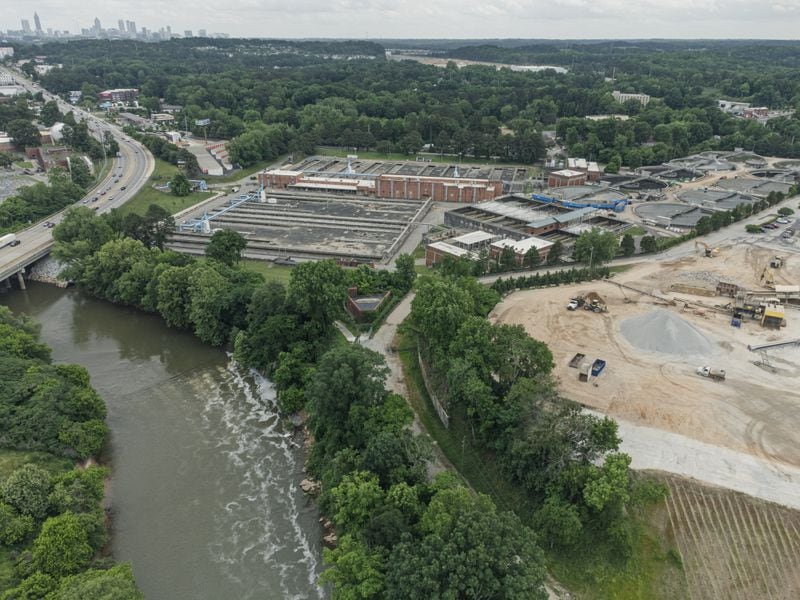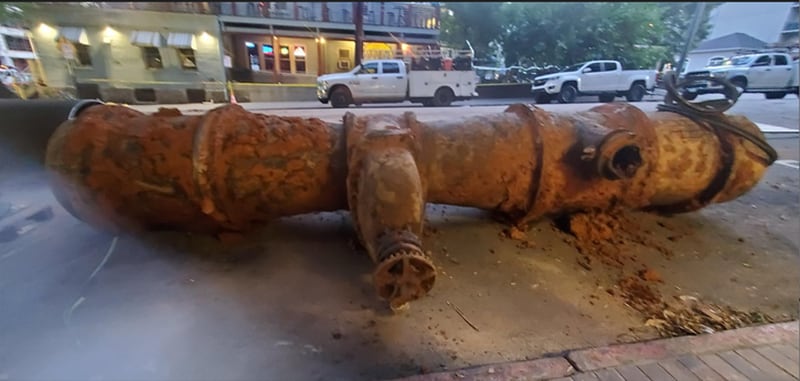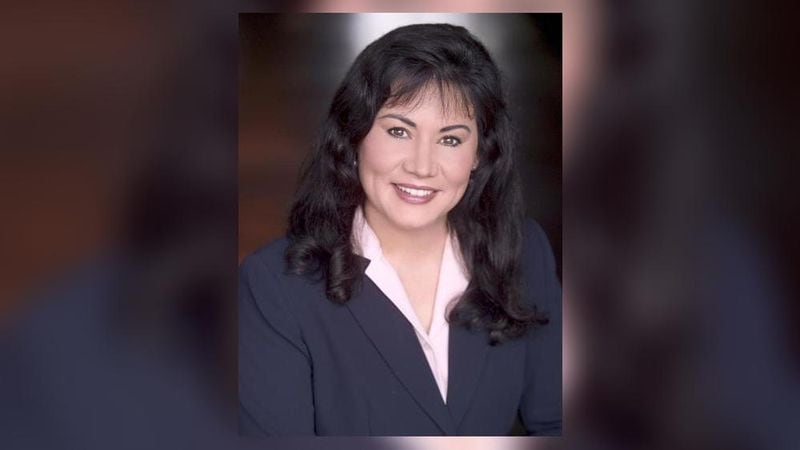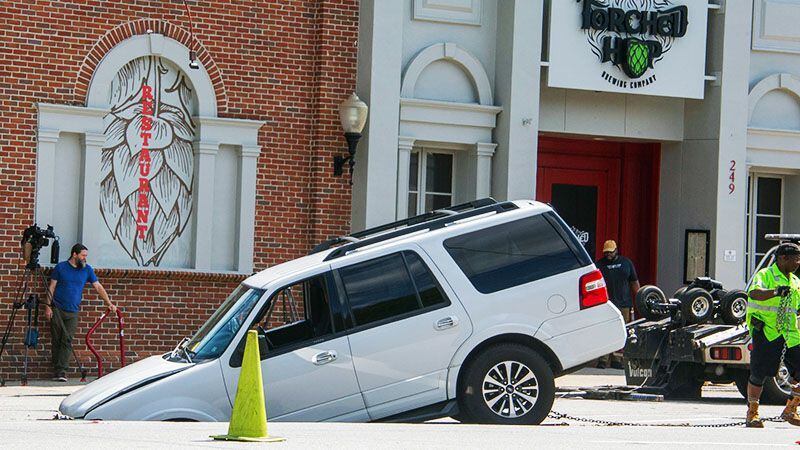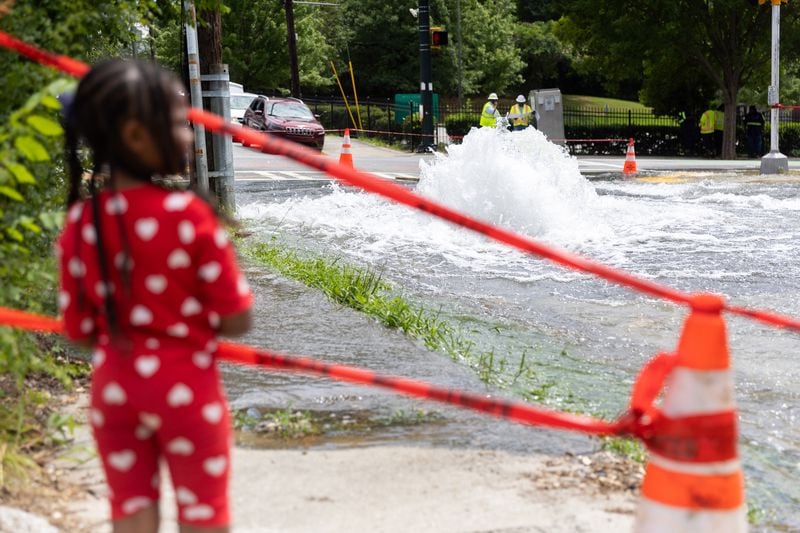The Atlanta water crisis that crippled large sections of the city and left thousands of residents without clean water for nearly a week shone a bright national spotlight on vulnerabilities lurking in the city’s aging infrastructure.
It highlighted the city’s long history of managing water pipes and sewers by jumping from crisis to crisis. And it presents a major test for a city department mired for years in scandal and allegations of mismanagement.
“When you have a city that ends up having 500 water main breaks and leaks a year, you know you have a problem,” Mayor Andre Dickens said Thursday on The Atlanta Journal-Constitution’s Politically Georgia show.
The costly task of replacing the pipes that run beneath Atlanta will eventually fall to the Department of Watershed Management, an agency with a long history of trouble and a new leader who has been on the job about a month.
Credit: HYOSUB SHIN / AJC
Credit: HYOSUB SHIN / AJC
The department has suffered a series of black eyes that emerge in city audits, court records and other investigations. In just the last decade, it has been beset by revelations that the department lost 10,000 water meters and an $80,000 backhoe. The department let council members pay less than they owed on their water bills and failed to collect some $200 million from all of its customers. One former commissioner is in federal prison for taking bribes from a contractor.
Since the department’s creation 21 years ago, the state of the drinking water has hardly been its top priority.
Watershed Management is a massive agency, handling more than $700 million of revenue last year alone. In addition to running Atlanta’s stormwater system and providing drinking water to more than 1 million people in Atlanta and throughout much of Fulton County, it treats 131 million gallons of sewage a day.
And for most of its history, wastewater has been its central problem.
Credit: SPECIAL
Credit: SPECIAL
The city once routinely dumped human filth into Piedmont Park and the Chattahoochee River. Then a federal judge ordered it to clean up its act, and Atlanta undertook billions of dollars in projects to end the overflows.
In the process, city leaders lost sight of the warning signs emerging in the pipes that carry drinking water to residents, auditors found. In some areas, Atlanta was relying on water mains older than the Model T Ford, and hundreds of pipes were springing leaks. At the same time, Atlanta’s population had seen massive growth.
The city hadn’t settled on a clear plan to update its drinking water system when geysers in downtown and Midtown ratcheted up the stakes.
Unintended consequences
Investment in Atlanta’s water infrastructure has almost always been spurred by crisis.
Thirty years ago, Piedmont Park would turn into an open sewer every time it rained. One inch of rain sent the equivalent of 220 Olympic-size pools of raw sewage into the park, according to an AJC report at the time. The system, initially designed more than a century ago, routinely dumped waste into the Chattahoochee and South rivers.
“As you got more people, as you had more water moving through the system, these kind of overflow moments went from occasional to daily,” Skye Borden, author of “Thirsty City: Politics, Greed, and the Making of Atlanta’s Water Crisis,” told the AJC.
In 1995, state and federal environmental agencies sued the city of Atlanta for violating the Clean Water Act. The lawsuit led to two federal consent decrees in the late 1990s, legally binding mandates laying out the improvements city officials would have to make to the city’s sewers.
By the early 2010s, Atlanta’s system had improved dramatically, but the progress came at a high price.
Credit: Courtesy of the City of Atlanta
Credit: Courtesy of the City of Atlanta
To meet the consent decrees’ requirements, the city imposed a sales tax and tripled its water and sewer rates, making them among the nation’s most expensive. As those dollars rolled in, the department funneled the vast majority of its infrastructure spending toward the sewer system for the better part of a decade.
Spending on the sewers outpaced the drinking water system by more than five to one, the city said in a 2012 court filing. That took a toll, according to a 2017 report by the city auditor, who found Atlanta was losing more and more drinking water to leaky pipes. Some of the city’s main arteries dated to the 1890s and 1900s, yet fixing the sewer system appeared to cause “underinvestment” in drinking water infrastructure, the auditors wrote.
Concerned about the disproportionate spending, the city in 2012 asked federal authorities and a judge for permission to slow down its sewer projects, which they granted.
“It was almost like we were able to take a breath and take a look at the entirety of the system,” said Natalyn Archibong, a former city councilwoman who previously chaired Atlanta’s City Utilities Committee.
The city ramped up its spending on drinking water projects, yet spending on water mains was a relatively modest part of the plan. After years of drought and in the face of a growing population, Atlanta leaders were instead more concerned with bolstering the city’s water supply.
The city spent more than $300 million to build a reservoir in a rock quarry at the center of what is now Westside Park to ensure Atlanta had access to a month’s worth of water.
Meanwhile, watershed management planned to spend less than a tenth of its construction budget on the pipes that get that water to homes and businesses, according to the department’s presentations to the City Council in recent years.
The result: Atlanta has been replacing its roughly 2,900 miles of water mains at an anemic pace. Laid end to end, the pipes underneath the city would stretch from Atlanta to the southern end of Alaska. Between 2016 and 2021, department figures show that it replaced an average of just 3.3 miles per year.
At its current pace of nearly 5 miles per year, the department said last year, Atlanta won’t fully replace its water main system for 580 years.
Checkered past
At the center of these challenges is the city’s watershed management department. The agency was born two decades ago under a cloud of frustration and suspicion.
Around the time the sewer decrees went into effect, then-Mayor Bill Campbell moved to privatize the city’s water operations. He signed a long-term contract to pay a private operator $21 million per year to run the system. That relationship later became part of a criminal investigation. Federal prosecutors accused Campbell of taking a trip to Paris on the water company’s dime and accepting questionable political contributions as part of a sprawling probe. (A jury acquitted him on a racketeering charge related to the trip, but found him guilty of filing false tax returns.)
The privatization effort was short-lived. In 2003, Mayor Shirley Franklin terminated the contract early because of a raft of issues with the company and officially established the Department of Watershed Management, a first for the city.
Franklin put forward the Municipal Option Sales Tax, a one-cent tax the city still charges to underwrite the consent decree projects. That tax helped fund more than $2.3 billion in new sewer projects overseen by the watershed department.
Meanwhile, new issues continued to emerge: Audits found the new department was ineffective at collecting overdue water bills and that its system was vulnerable to leaks. All the while, Atlantans were paying sky-high rates.
From 2002 to 2012, water and sewer rates increased by 252% to be able to pay for the consent decree improvements, according to court documents.
By the time Mayor Kasim Reed took office in 2010, confidence in the department had plummeted. He brought in a new leader, Jo Ann Macrina, who was meant to restore the public’s faith. She instead led a department dogged by theft and mismanagement.
A 2014 city audit found the watershed department had such lax security it was unable to track how much equipment had been lost or stolen.
Macrina was fired in 2016. She was later indicted on federal bribery charges for allegedly accepting gifts from a contractor in exchange for multimillion-dollar city contracts. A jury found her guilty in 2022 and a judge later sentenced her to more than four years in prison.
The department’s issues did not end with Macrina’s departure. In 2017, documents showed several council members, including then-Councilwoman Keisha Lance Bottoms, repeatedly failed to pay their water bills on time. A recent audit found as of June 2023, Atlanta watershed customers had racked up nearly $200 million in unpaid water bills.
Last year, a broken sewer pipe created a sinkhole that nearly swallowed an SUV on Ponce de Leon Avenue.
Credit: Katelyn Myrick
Credit: Katelyn Myrick
The city was also fined $485,000 in March for violating the consent decree and the state notified officials of violations at its largest wastewater treatment plant, including discharging poorly treated sewage into the Chattahoochee. Another $163,000 in fines were levied last month for sewage spills into the Chattahoochee and South rivers and other waterways.
But the water system crisis came to a head when major pipes burst in Vine City on May 31 and in Midtown the next day.
Moving forward
City leaders have vowed the crisis will pull the drinking water system off the back burner, but for now, they have more questions than answers about how to move forward.
“My goal is to get to the bottom of everything that has happened, has not happened, will happen and to fix these water issues for us,” said Councilman Antonio Lewis, who became chair of the City Utilities Committee in January.
Lewis became chair because he wanted to help lower people’s water bills, but now fixing the city’s pipes is another issue he’ll need to tackle.
Credit: TNS
Credit: TNS
Howard Shook, a longtime member of the City Utilities Committee, said he had a laundry list of questions for watershed management: Does the department know where its biggest problems are? Does it have a plan to deal with them? And does it have enough money?
“It’s a much higher priority today,” said Shook, who first ran for office in 2001 because of the sewer problems. “I don’t worry about the plumbing in my house until something breaks.”
On Politically Georgia, Dickens likewise said the outage was “a wake-up call to see what else we need to fix.”
The mayor has announced a blue-ribbon panel to make recommendations and asked the U.S. Army Corps of Engineers to determine what it would take to make the system “best-in-class.” He also said he will ask the federal government for billions in investment.
Atlanta will begin drawing up those plans just three years before it reaches its court-ordered deadline to fix its sewer system, responding yet again to an infrastructure crisis.
The Atlanta Journal-Constitution and Report for America are partnering to add more journalists to cover topics important to our community. Please help us fund this important work here.
